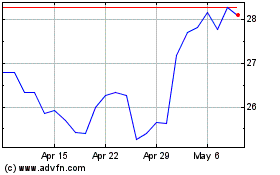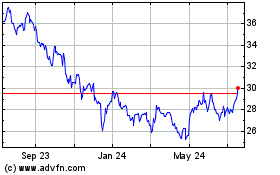Pfizer Scraps Plan to Break Up Company -- WSJ
September 27 2016 - 3:03AM
Dow Jones News
By Jonathan D. Rockoff and Austen Hufford
Pfizer Inc. said Monday it would remain a single company,
deciding not to split into one business focused on patent-protected
drugs and another on cash-rich older products.
The decision means the New York City-based drug company would
remain one of the industry's largest. It projects at least $51
billion in revenue this year from a growing portfolio of cancer
drugs and vaccines as well as a pipeline with copies of expensive
big-molecule drugs.
Pfizer spent at least $600 million preparing for a potential
split, a spokeswoman said. Chief Executive Ian Read said staying
whole was "the best structure," though the company would "preserve
our option to split our businesses should factors materially change
at some point in the future."
Shares of Pfizer fell 1.7% in trading on the New York Stock
Exchange Monday morning.
Mr. Read had been considering a breakup for years as a way to
reduce the big pharmaceutical company's complexity while rewarding
shareholders with the windfall from a split into two stocks. Toward
that goal, Pfizer shed its animal-health business and created two
internal organizations.
Many on Wall Street thought the odds of a companywide breakup
rose after Pfizer agreed late last year to a $150 billion deal for
Allergan PLC. But Pfizer walked away from the tie-up when the Obama
administration moved earlier this year t o deter such tax-lowering
inversion deals.
Meanwhile, the stocks of innovative pharmaceutical companies
rose amid new-drug approvals, while shares in generic- and
specialty-drug companies fell amid questions about their abilities
to grow.
The varying performances suggested hiving off a separate
business focused on off-patent drugs might not generate the level
of market returns that had once been expected, while denying the
new-drugs company all the cash generated by the older
medicines.
That cash funds the company's new sources of growth, according
to Citi Research, including the drug-development work of the
company's laboratories and deals such as the recently announced
agreement to buy Medivation Inc. and its prostate-cancer drug
Xtandi for $14 billion.
Pfizer said in a news release announcing the decision that a
supposed "valuation gap" between the company's market cap and the
value of its individual units has closed over time.
"We believe that by operating two separate and autonomous units
within Pfizer we are already accessing many of the potential
benefits of a split -- sharper focus, increased accountability, and
a greater sense of urgency -- while also retaining the operational
strength, efficiency and financial flexibility of operating as a
single company," Mr. Read said.
Pfizer's new-drugs business had $26.8 billion in sales last year
from the Prevnar pneumonia vaccine, Ibrance breast-cancer treatment
and other patent-protected medicines whose sales are
increasing.
Meantime, the company's older-drugs business notched $22.1
billion in sales mostly from products that have lost patent
protection and therefore are losing sales, such as
cholesterol-lowering drug Lipitor and menopausal drug Premarin.
Write to Jonathan D. Rockoff at Jonathan.Rockoff@wsj.com and
Austen Hufford at austen.hufford@wsj.com
(END) Dow Jones Newswires
September 27, 2016 02:48 ET (06:48 GMT)
Copyright (c) 2016 Dow Jones & Company, Inc.
Pfizer (NYSE:PFE)
Historical Stock Chart
From Mar 2024 to Apr 2024

Pfizer (NYSE:PFE)
Historical Stock Chart
From Apr 2023 to Apr 2024
